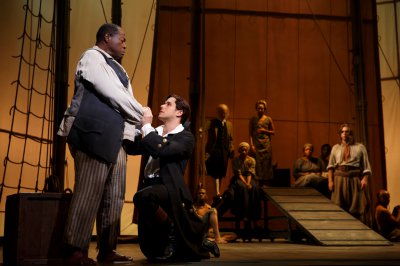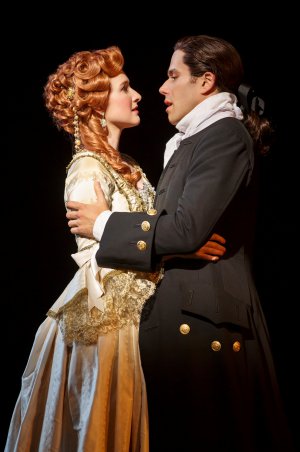Amazing Grace
Though this new musical is lacking in subtlety, many will succumb to the siren call of its title song.
[avatar user=”Joel Benjamin” size=”96″ align=”left” ] Joel Benjamin, Critic[/avatar] Amazing Grace, the new musical by newcomer Christopher Smith (songs) and Smith and veteran playwright Arthur Giron (book) at the Nederlander Theatre tells the odd but true tale of the creation of that cherished spiritual, now ubiquitous at funerals and solemn occasions of all stripes.
Famously, it was an 18th century slave trader who redeemed himself, after many gruesome twists and turns in his life, by writing this song. Told with something approaching accuracy, Amazing Grace nevertheless is less than compelling as both history and theater. What might have been a fascinating tale has been reduced to a melodrama complete with a villain who all but twirls his mustache, a hard-to-win love interest, an African princess who provides an excuse for some passionate dancing and many examples of physical and emotional torture of slaves, all accompanied by a series of soaring contemporary ballads.
Messrs. Smith and Giron, , director Gabriel Barre,choreographer Christopher Gattelli, and the design team—Eugene Lee/Edward Pierce, scenery; Toni-Lesie James, costumes; and Ken Billington & Paul Miller, lights—cannot be faulted in their professionalism. Amazing Grace looks good and is certainly well acted by dedicated cast led by Josh Young as John Newton, musical scholar and member of a slave-trading family. In the show’s opening he and his father sing “Truly Alive,” extolling their life at sea.
He falls for aristocratic Mary Catlett, a sympathetic, bright-voiced Erin Mackey. The irony is that Mary has a loyal Black maid, Nanna, played by a stoically noble Laiona Michelle who is virtually a slave. John shocks Mary by seizing control of a slave auction. Seeing a slave branded converts Mary to the abolitionist cause.
Plot twists, including shipwrecks, native uprisings and devious slave dealers, keep them apart until the very end.
Major Gray (a colorful, slimy Chris Hoch) is an oily character, a gung-ho supporter of England’s slave traders. He expresses his conservative ideas in “Expectations.” Hoch is amusing but two-dimensional, allowing himself for a time to be manipulated by Mary in her quest to help the Abolitionists. Gray manages to get John Newton, his rival for Mary’s affections, gang-pressed into involuntary naval service. Captain Newton (a solid Tom Hewitt) refuses to help his son, thinking that the navy will improve him. Accompanied by his faithful slave/servant Thomas (a charismatic, robust Chuck Cooper), John very reluctantly boards the naval ship, leading to whippings and a shipwreck.
The writers make it clear that Black Africans were also complicit in the horrible business of slavery. One of them, Princess Peyai (Harriett D. Foy, who somehow keeps her clichéd character from becoming a cartoon), captures the shipwrecked John. Her ironic “Welcome Song” is the occasion for her tribal members to throw themselves into pulsating dance move.
John is forced to sell Thomas but in the end repurchases him and frees him. Thomas, who opens and closes the show with informative narration, re-establishes his given African name, Pakuteh.

Stanley Bahorek, Harriett D. Foy, Tom Hewitt and Chris Hoch in a scene from “Amazing Grace” (Photo credit: Joan Marcus)
By the end John becomes a born-again abolitionist Christian and the show concludes with a full-company rendition of “Amazing Grace,” joined, at least at the performance under review, by many audience members.
The cast finds every nuance in this material, singing the score, dancing the dances, and wearing the extravagant costumes with panache.
Though lacking subtlety, Amazing Grace will appeal to many who will succumb to its ersatz spiritual message of rebirth.
Amazing Grace (through October 25, 2015)
Nederlander Theatre, 208 West 41st Street, in Manhattan
For tickets, call 877-250-2929 or visit http://www.AmazingGraceMusical.com
Running time: two hours and 30 minutes including one intermission








Leave a comment